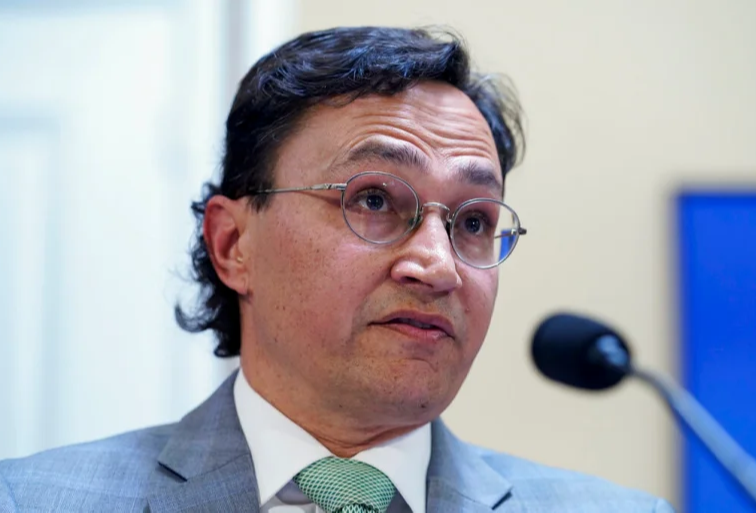
Cherokee Nation Chief Chuck Hoskin speaks during a House Rules Committee hearing on November 16, 2022 [Mariam Zuhaib/AP Photo]
Washington, November 17 (RHC)-- The United States Congress is exploring the possibility of honouring a promise made nearly 200 years ago: seating a delegate from the Cherokee Nation of Oklahoma, a Native American tribe, in the U.S. legislature.
Cherokee Nation Principal Chief Chuck Hoskin testified on Wednesday before a U.S. House Rules Committee, the first to examine the prospect of seating a Cherokee delegate in the chamber of Congress.
The 1835 Treaty of New Echota includes a provision allowing the Cherokee Nation to send a delegate to Washington, DC. A separate treaty in 1866 affirmed this right, Hoskin said. “The Cherokee Nation has in fact adhered to our obligations under these treaties,” he told the panel. “I’m here to ask the United States to do the same.”
The session took place amid calls for the U.S. to reckon with its history of violent displacement, racism and cultural erasure against Native Americans. “Article 7 of the Treaty of New Echota is crystal clear—Cherokee Nation ‘shall be entitled to a delegate in the House of Representatives of the United States whenever Congress shall make provision for the same’,” the Cherokee Nation website notes.
The treaty was used as the legal basis for the US government’s forced removal of Cherokee Nation members from their homelands east of the Mississippi River. According to the U.S. National Parks Service (NPS), it was carried out under coercive and illegal circumstances.
Although most Cherokee Nation members opposed removal, the U.S. sought out a small minority who believed a treaty was the only way to survive amid rapid expansion westward. In December 1835, the U.S. met with a group of Cherokee people to sign a treaty ceding all Cherokee territory east of the Mississippi to the United States. Not a single elected representative of the Cherokee Nation was present and more than 15,000 protested.
Violent removals soon followed. “In May 1838, Federal troops and state militias began the roundup of the Cherokees into stockades,” the NPS said. “Families were separated-the elderly and ill forced out at gunpoint – people given only moments to collect cherished possessions. White looters followed, ransacking homesteads as Cherokees were led away.”
By November, about 12,000 Cherokee had been sent on a brutal, 1,290km (800 miles) journey west, the NPS said. While the exact number of those killed in what became known as the “Trail of Tears” is not known, the agency cited a doctor who accompanied the removal and said nearly one-fifth of the Cherokee population died as a result of the removals.
Hoskin set the process of getting a Cherokee delegate into the House in motion in 2019. That is when he nominated Kimberly Teehee, an adviser to former President Barack Obama, for the position. The tribe’s governing council approved her unanimously.
On Wednesday, Hoskin suggested to the committee that Teehee could be seated as early as this year by way of either a resolution or change in statute. The committee’s Chairman, Massachusetts Democratic Representative James McGovern, and other members supported the idea that it could be accomplished quickly.
“This can and should be done as quickly as possible,” McGovern said. “The history of this country is a history of broken promise after broken promise to Native American communities. This cannot be another broken promise.”
However, committee members noted that some questions remain, including whether other tribes could be afforded similar representation and whether the Cherokee Nation of Oklahoma is the proper inheritor of the agreement.
McGovern said he has been contacted by officials with the Choctaw Nation of Oklahoma and the Delaware Nation, both of which have separate treaties with the US government that call for some form of representation in Congress. McGovern also noted there are two other federally recognised bands of Cherokee Indians who argue they should be considered successors to the 1835 treaty: the United Keetoowah Band (UKB) of Cherokee Indians in Oklahoma and the Eastern Band of Cherokee Indians based in North Carolina, both of which reached out to his office.
The UKB selected its own congressional delegate, Oklahoma lawyer Victoria Holland, in 2021. Holland said in an interview with The Associated Press that her tribe is a successor to the Cherokee Nation that signed the 1835 treaty, just like the Cherokee Nation of Oklahoma.
“As such, we have equal rights under all the treaties with the Cherokee people and we should be treated as siblings,” Holland said.
Members of the committee also seemed to agree the delegate would take on a role similar to representatives of other territories such as the District of Columbia, Guam, the Commonwealth of the Northern Mariana Islands, American Samoa and the Virgin Islands, all of which can submit amendments to bills but are not allowed to vote on their final passage.
Markwayne Mullin, a member of the Cherokee Nation, was elected to the US Senate earlier this month, making him the first Native American to serve in the Senate in nearly 20 years.
“As a member of the Cherokee Nation, I firmly believe the federal government must honor its trust and treaty responsibilities to Indian Nations,” Mullin said in a statement. “We are only as good as our word.”

